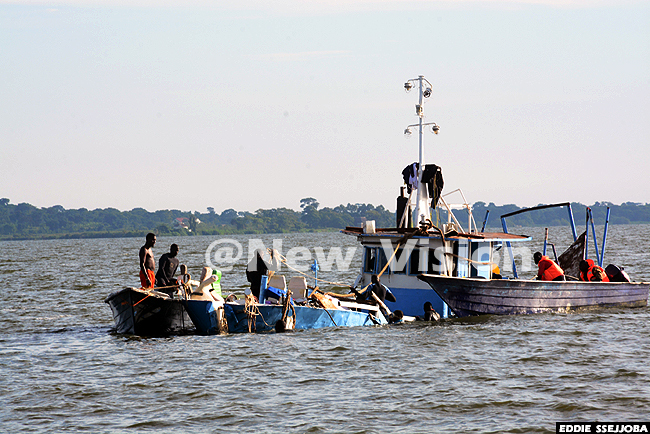Lake Victoria boat tragedy: The other story
The charged fun-seekers insisted and got their way and freedom to sail on a rickety boat.
OPINION
Had revellers heeded the Marine Police warning not to board the ill-fated boat and consequently aborted the adventure to K-Palm Beach, the Saturday tragedy would have been averted.
The charged fun-seekers insisted and got their way and freedom to sail on a rickety boat.
Not only did their disregard of Police warning lead to death and devastation, but also killed another story had they respected the caution. As clear as daylight, the big story would have been Police blocking people from sailing on Lake Victoria or even going to party on the island.
Certainly this would have been construed as interfering with people's freedom to have fun.
The story would have got many wondering what is wrong with people sailing on a boat heading to a beach where the climax had been planned. Police explanation that the boat was in a dangerous condition risking the lives of revellers would have been dismissed with furious scorn.
The force, as usual, would have been projected as an oppressive entity bent on curtailing people's freedoms. This would have been the story of the week. With several party-goers drunk before boarding, some would have attacked the Police, asking why they had blocked the boat.
Ensuing running battles would have followed, buoying the story. Politicians would have quickly jumped in the fray.
The Opposition would have hyped it as orchestrated restriction of people's freedom. They would have made it convincing by adding that it was a move aimed at stopping young people, who were the majority, from gathering. And probably, they would have even claimed the youth on the boat were their supporters. Talk shows on TV and radio would have had guests attacking the Police and the Government.
The ruling National Resistance Movement (NRM) politicians caught flatfooted, unable to explain the Police action and sensing the young people being swayed by the Opposition claims, would have also hit at the Police.
And probably the Police officers on duty that day would have been summoned to appear before the standards unit to explain why they interfered with people's freedom to sail.

Some NRM politicians would probably have accused the Police of having a plot of denting the party or government's image. Others would have accused the Police unit that blocked the revellers of being sympathetic with the Opposition.
With the presence of Prince David Wassajja, there is no doubt the story would have been spiced up to the detriment of government. It would have been projected as blocking a Buganda prince with his friends on the way to attend the launch of K-Palm Beach in Mukono in Buganda. This would have incensed the Baganda.
The party boat was headed to Mukono, a district of Buganda, as spelled out in the Constitution, so the story of a prince denied to travel in Buganda Kingdom, which has his brother, Ronald Mutebi, as the Kabaka.
Any opposition politician would have opportunistically taken advantage of this to drive a wedge between Buganda and the Government or even President Yoweri Museveni and the Kabaka. Such a story could have escalated tension and misunderstanding between the Government and Buganda. Or even provoked riots in Kampala.
The above are the possible scenarios that could have happened if the Police had successfully blocked MV Templar from taking its voyage. So, the Police's failure raises a fundamental question: How can an institution such as the Police fail to take action to avert danger?
It is partly because politicians have succeeded in projecting the Police as partisan and, therefore, should be defied. This explains why they frequently resist arrest or defy the Police warnings.
It helps them make news and build political capital but the consequence is people emulating them by disrespecting the Police orders and even resisting arrest. In some instances, the Police's conduct has also encouraged the disrespect because of slapping trumped-up charges on people for a fee.
Or taking bribes to cause arrest. Nevertheless, people irrespective of their status are expected to respect the Police.
Speaking in Parliament this week, Monica Azuba Ntege, the works minister, stressed: "It should be emphasised that there is need for citizens of Uganda to respect government agencies, especially the Uganda Police Force, whose duty is to keep law and order."
Disrespect of the Police coupled with reckless behaviour puts many lives in danger. In the Saturday tragedy, revellers did not care that they were boarding a wobbly boat and take necessary precaution to wear life jackets. They hardly heeded the boatman's call to "balance the boat".
Recklessness happens all the time in Uganda. They include people travelling dangerously crammed in taxis and buses driving at breakneck speed. They ride on bodabodas shared by two or three passengers unbothered.
Motorists overtaking in a bend and overloaded boats. Many Ugandans think they are invincible until the tragic end.
The writer is a journalist
Also related to this article
Lake Victory tragedy: A look inside the killer boat